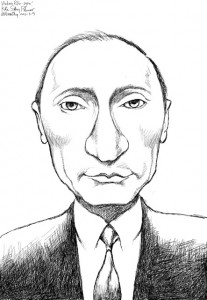As the West becomes more and more infuriated by Vladimir Putin, it’s extraordinary how little is known about him. Up to now all I had picked up was his neurotic obsession with physical fitness and macho imagery. So this long piece in Newsweek by Ben Judah, one of Putin’s biographers, made fascinating reading. It’s written in the style of a medieval chronicler describing life in a monarchical court.
Consider this passage, about Putin’s daily routine:
The President wakes late and eats shortly after noon. He begins with the simplest of breakfasts. There is always cottage cheese. His cooked portion is always substantial; omelette or occasionally porridge. He likes quails’ eggs. He drinks fruit juice. The food is forever fresh: baskets of his favourites dispatched regularly from the farmland estates of the Patriarch Kirill, Russia’s religious leader.
He is then served coffee. His courtiers have been summoned but these first two hours are taken up with swimming. The President enjoys this solitary time in the water. He wears goggles and throws himself into a vigorous front crawl. This is where the political assistants suggest he gets much of Russia’s thinking done.
The courtiers joke and idle and cross their legs in the lacquered wood waiting rooms. He rarely comes to them quickly. They say three, perhaps four hours is the normal wait for a minister. He likes to spend some time in the gym where Russian rolling news is switched on. There he enjoys the weights much more than the exercise bikes.
He sometimes reads after the sweat. This is because he likes to work late into the night. He summons his men at the hours that suit his mental clarity – the cold hours where everything is clearer. The books he finds most interesting, are history books. He reads these attentively. Heavy, respectable tomes: about Ivan the Terrible, Catherine II, Peter the Great.
[…]
He spends time completing his cleanse. He immerses himself into both hot and cold baths. Then the President dresses. He chooses to wear only tailored, bespoke suits in conservative colours. His choice of ties is usually dour.
And now power begins…
Or this, about his personal style:
There are no stories of extravagance: only of loneliness. The President has no family life. His mother is dead. So is his father. His wife suffered nervous disorders, and after a long separation, there has been a divorce. There are two daughters. But they are a state secret and no longer live in Russia. There are rumours of models, photographers, or gymnasts that come to him at night. But there is a hollow tick to these stories, which no courtier can quite explain.
The President loves animals. He smiles at the sight of creatures that refuse to obey him. The President finds solace in the company of a black Labrador, who is not afraid of him. He enjoys the hunting parties. He enjoys the helicopter rides with camera-crews over the grey-white tundra looking for tigers and bears – the beauty of Russia.
Or this, about his working practices:
The early afternoon is about briefing notes. This mostly takes place at his heavy wooden desk. These are offices without screens. The President uses only the most secure technologies: red folders with paper documents, and fixed-line Soviet War era telephones.
The master begins his work day by reading three thick leather-bound folders. The first – his report on the home front compiled by the FSB, his domestic intelligence service. The second – his report on international affairs compiled by the SVR, his foreign intelligence. The third – his report on the court complied by the FSO, his army of close protection.
He is obsessed with information. The thickest, fattest folders at his request are not intelligence reports: they are press clippings. His hands first open the Russian press digest. The most important papers come at the front: the obsequious national tabloids – such as Komsomolskaya Pravda and Moskovsky Komsomolets. These matter most, with their millions of readers. Their headlines, their gossip columns, their reactions to the latest Siberian train wreck affect the workers’ mood.
Then he moves onto Russia’s quality press: the lightly censored broadsheets, Vedomosti and Kommersant. These matter in the Kremlin court: this is their gossip, their columnists, their analysis. He pays particular attention to the regular columns about Vladimir Putin written by Andrey Kolesnikov in Kommersant. His courtiers say he enjoys this one greatly and always reads right to the end.
Putin’s life, by this account, is “monotonous”.
The meaningless meetings. The pedantic clip of presidential protocol. The repetitive routine these schedules have year after year. His motorcade goes in two directions: either to the Kremlin or to the airport. The President says that he works harder than any leader since Stalin.
The reference to the motorcade commute is explained by the writer’s claim that Putin hates working in the Kremlin and much prefers to work at his estate outside Moscow.
It’s a fascinating piece, well worth reading in full. Given that all of the information comes from anonymous sources, it’s impossible to know how accurate it is, but if it’s even 50% accurate then the West is dealing with a very strange guy indeed. It also makes one wonder what he wants power for. There’s no mention in the piece, for example, of the stories about Putin’s allegedly vast personal wealth.

